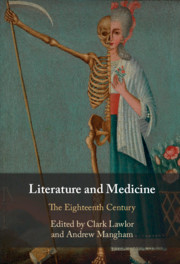Book contents
- Literature and Medicine
- Literature and Medicine
- Copyright page
- Contents
- Figures
- Contributors
- Acknowledgements
- Introduction
- Part I Literary Modes
- Part II Psyche and Soma
- Part III Professional Identity and Culture
- Chapter 8 Physician-Authors, Predisciplinarity, and Predatory Writing
- Chapter 9 ‘The Compleat, Common Form’
- Chapter 10 Anatomy and Interiority
- Index
Chapter 8 - Physician-Authors, Predisciplinarity, and Predatory Writing
John Polidori
from Part III - Professional Identity and Culture
Published online by Cambridge University Press: 03 June 2021
- Literature and Medicine
- Literature and Medicine
- Copyright page
- Contents
- Figures
- Contributors
- Acknowledgements
- Introduction
- Part I Literary Modes
- Part II Psyche and Soma
- Part III Professional Identity and Culture
- Chapter 8 Physician-Authors, Predisciplinarity, and Predatory Writing
- Chapter 9 ‘The Compleat, Common Form’
- Chapter 10 Anatomy and Interiority
- Index
Summary
After Michel Foucault’s groundbreaking work on the history of madness in Madness and Civilization (trans. 1965), what may be viewed as a new field of literary criticism arose: studies that explore literary representations of insanity. With a focus on critical studies about British literature and medicine of the long eighteenth century, this chapter will demonstrate the range of work that has shaped this field, draw special attention to those studies that investigate the phenomenon of physicians who were also literary writers, and interrogate the ethical implications that arise when doctors contribute to the belles-lettres. With respect to this final point, the negative implications of this practice become clear in consideration of its triangulated relationship with two other increasingly important developments in Romantic-era medicine and literature: the development of psychology as a medical specialty and the popularity of the case history. This chapter interrogates the ethics of physicians’ literary use of patient information to suggest that this singular moment in literary history presented the potential for a uniquely predatory relationship between the creative writer and the often real-life subject about whom he wrote. The case of John Polidori, Lord Byron’s doctor during the 1816 summer of the Villa Diodati, and author of The Vampyre (1819) and Ernestus Berchtold (1819), poses such challenging questions about the ethical responsibilities of the physician-cum-literary writer.
- Type
- Chapter
- Information
- Literature and MedicineThe Eighteenth Century, pp. 189 - 218Publisher: Cambridge University PressPrint publication year: 2021

